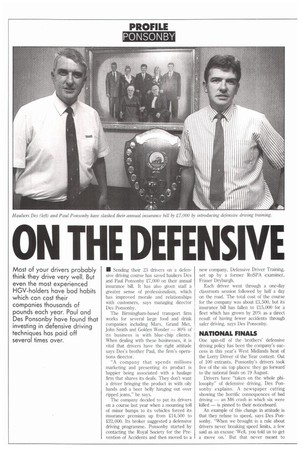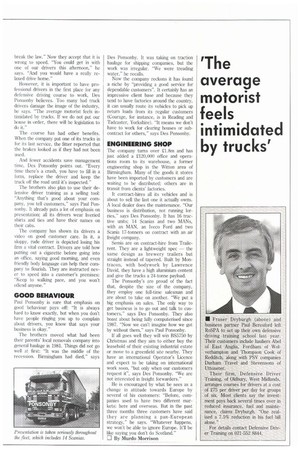ON THE DEFENSIVE
Page 36

Page 37

If you've noticed an error in this article please click here to report it so we can fix it.
• Sending their 23 drivers on a defensive driving course has saved hauliers Des and Paul Ponsonby 27,000 on their annual insurance bill. It has also given staff a greater sense of professionalism, which has improved morale and relationships with customers, says managing director Des Ponsonby.
The Birmingham-based transport firm works for several large food and drink companies including Mars, Grand Met, John Smith and Golden Wonder — 80% of its business is with blue-chip clients. When dealing with these businesses, it is vital that drivers have the right attitude says Des's brother Paul, the firm's operations director.
"A company that spends millions marketing and presenting its product is happier being associated with a haulage firm that shares its deals. They don't want a driver bringing the product in with oily hands and a beer belly hanging out over ripped jeans," he says.
The company decided to put its drivers on a course last year when a mounting toll of minor bumps to its vehicles forced its insurance premium up from £14,500 to £22,000. Its broker suggested a defensive driving programme. Ponsonby started by contacting the Royal Society for the Prevention of Accidents and then moved to a new company, Defensive Driver Training, set up by a former RoSPA examiner, Fraser Dryburgh.
Each driver went through a one-day classroom session followed by half a day on the road. The total cost of the course for the company was about £3,500, but its insurance bill has fallen to E15,000 for a fleet which has grown by 20% as a direct result of having fewer accidents through safer driving, says Des Ponsonby.
NATIONAL FINALS
One spin-off of the brothers' defensive driving policy has been the company's success in this year's West Midlands heat of the Lorry Driver of the Year contest. Out of 100 entrants, Ponsonby's drivers took five of the six top places: they go forward to the national finals on 19 August.
Drivers have "taken on the whole philosophy" of defensive driving, Des Ponsonby explains. A newspaper cutting showing the horrific consequences of bad driving — an M6 crash in which six were killed — is pinned to their noticeboard.
An example of this change in attitude is that they refuse to speed, says Des Ponsonby. "When we brought in a rule about drivers never breaking speed limits, a few said as an excuse 'Well, you told us to get a move on.' But that never meant to break the law." Now they accept that it is wrong to speed. "You could get in with one of our drivers this afternoon," he says. "And you would have a really relaxed drive home."
However, it is important to have professional drivers in the first place for any defensive driving course to work, Des Ponsonby believes. Too many bad truck drivers damage the image of the industry, he says. "The average motorist feels intimidated by trucks. If we do not put our house in order, there will be legislation to do it."
The course has had other benefits. When the company put one of its trucks in for its last service, the fitter reported that the brakes looked as if they had not been used.
And fewer accidents save management time, Des Ponsonby points out. "Every time there's a crash, you have to fill in a form, replace the driver and keep the truck off the road until it's inspected."
The brothers also plan to use their defensive driver training as a selling tool: "Anything that's good about your company, you tell customers," says Paul Ponsonby. It already puts a lot of emphasis on presentation; all its drivers wear liveried shirts and ties and have their names on their cabs.
The company has shown its drivers a video on good customer care. In it, a sloppy, rude driver is depicted losing his firm a vital contract. Drivers are told how putting out a cigarette before going into an office, saying good morning, and even friendly body language can help their company to flourish. They are instructed never to speed into a customer's premises: "Keep to walking pace, and you won't offend anyone."
GOOD BEHAVIOUR
Paul Ponsonby is sure that emphasis on good behaviour pays off: "It is always hard to know exactly, but when you don't have people ringing you up to complain about drivers, you know that says your business is okay."
The brothers moved what had been their parents' local removals company into general haulage in 1981. Things did not go well at first: "It was the middle of the recession. Birmingham had died," says Des Ponsonby. It was taking on traction haulage for shipping companies, but the work was irregular. "We were treading water," he recalls.
Now the company reckons it has found a niche by "providing a good service for dependable customers". It certainly has an impressive client base and because they tend to have factories around the country, it can usually route its vehicles to pick up return loads from its regular customers (Courage, for instance, is in Reading and Tadcaster, Yorkshire). "It means we don't have to work for clearing houses or subcontract for others," says Des Ponsonby.
ENGINEERING SHOP
The company turns over £1.8m and has just added a £120,000 office and operations room to its warehouse, a former engineering shop in the Witton area of Birmingham. Many of the goods it stores have been imported by customers and are waiting to be distributed; others are in transit from clients' factories.
It contract-hires all its vehicles and is about to sell the last one it actually owns. A local dealer does the maintenance. "Our business is distribution, not running lorries," says Des Ponsonby. It has 16 tractive units; 14 Scanias and two MANs, with an MAN, an Iveco Ford and two Scania 17-tonners on contract with an air freight company.
Semis are on contract-hire from Trailerent. They are a lightweight spec — the same design as brewery trailers but straight instead of tapered. Built by Montracon, with bodywork by Lawrence David, they have a high aluminium content and give the trucks a 24-tonne payload.
The Ponsonby's are proud of the fact that, despite the size of the company, they employ one full-time salesman and are about to take on another. "We put a big emphasis on sales. The only way to get business is to go out and talk to customers," says Des Ponsonby. They also boast about being fully computerised since 1987. "Now we can't imagine how we got by without them," says Paul Ponsonby.
If all goes well they will win BS5750 by Christmas and they aim to either buy the leasehold of their existing industrial estate or move to a greenfield site nearby. They have an international Operator's Licence and expect to be taking on international work soon, "but only when our customers request it", says Des Ponsonby. "We are not interested in freight forwarders."
He is encouraged by what he sees as a change in attitude towards Europe by several of his customers: "Before, companies used to have two different markets: here and overseas. But in the past three months three customers have said they are planning a pan-European strategy," he says. "Whatever happens, we won't be able to ignore Europe. It'll be like saying you don't do Scotland."
1=1 By Murdo Morrison












































































































